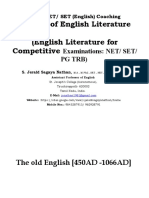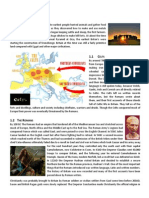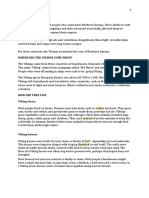Anglosaxon RF
Anglosaxon RF
Uploaded by
api-263784319Copyright:
Available Formats
Anglosaxon RF
Anglosaxon RF
Uploaded by
api-263784319Original Title
Copyright
Available Formats
Share this document
Did you find this document useful?
Is this content inappropriate?
Copyright:
Available Formats
Anglosaxon RF
Anglosaxon RF
Uploaded by
api-263784319Copyright:
Available Formats
Anglo Saxon Period
449-1066
Settlers in Britain
The Romans invaded Britain in AD43. After that,
for 400 years southern Britain was part of the
Roman world.
The last Roman soldiers left Britain in AD 410,
and then new people came in ships across the
North Sea.
Historians call them Anglo-Saxons. The new
settlers were a mixture of people from north
Germany, Denmark and northern Holland. Most
were Saxons, Angles and Jutes.
Anglo Saxon Period
In 449, three groups invaded
Britain
Angles
Saxons
Jutes
Anglo Saxon Period
Anglo-Saxons
Drove the natives from the eastern,
central, and southern areas
Became known as Angles Land or
England
Germanic language developed into
Angle-ish or English
An Anglo-Saxon village
An Anglo-Saxon village
There were many jobs to be done in an Anglo-
Saxon village, such as chopping firewood,
churning butter and grinding flour.
A typical village would have a metal forger and a
builder.
Children didn't have time to play as there was lots
of jobs to do to help their families.
A lot of Saxons were pagans, meaning they
believed in spells and charms and worshipped
several gods.
How the Anglo-Saxons lived
In their own lands, most Anglo-Saxons were
farmers. They lived in family groups in villages,
not cities.
Since they lived close to the sea and big rivers,
many Anglo-Saxons were sailors too.
They built wooden ships with oars and sails,
for trade and to settle in new lands.
Hunters brought home food for the family. These bowmen with
their dog have been out shooting birds.
Anglo Saxons & Religion
Anglo Saxons were Pagans
Paganism= polytheistic religion;
Fate vs. Personal Freedom
Christians believe that all individuals have the
freedom to make their own choice
Early Anglo Saxons worshipped ancient
gods of German mythology
Story-telling
Anglo-Saxons liked to gather in the lord's great
hall, to eat and drink, and to listen to songs and
stories.
They loved tales about brave warriorsand their
adventures.
A favourite story told how Beowulf, a heroic
prince, kills the fierce man-eating monster
Grendel, and Grendel's equally horrid mother.
The story of Beowulf was first written down in
the 8th-9th centuries, but long before that the
story was told around the fire.
The first lines of Beowulf, the Old English story-poem. It begins:
'So. The Spear Danes in days gone by and the kings who ruled
them had courage and greatness.'
A modern drawing of a Saxon thane, a local leader. Thanes had
land and led soldiers to battle, but they had to obey the king.
Anglo Saxons & Mead Hall
All {social} events began and ended at
Mead Hall
Mead: Fermented beverages made from
honey (Think of beer made from honey)
The hall was built by the local lord or king
for the entertainment of the Thanes
Thanes: warriors and soldiers loyal to the
local lord or king
The Anglo Saxon Man
Athletic
Strong
Seafaring
Adventurous
Strong belief in fair play
The 'warrior-code' of the Anglo-Saxons taught
that a warrior must fight and die for his leader,
if he had to.
Girls
Anglo-Saxons thought sons and daughters were
equally important, but girls' work centred on the
home.
They learned housekeeping skills such
as weaving cloth, cooking, making cheese and
brewing ale.
Girls and boys collected sticks for firewood, and
fetched water from a stream or well.
Only a few girls learned to read and write. By the
age of 10 a girl was considered grown-up.
Boys
Boys learned the skills of their fathers. They
learned to chop down trees with an axe, how to
plough a field, and how to use a spear in battle.
They rowed boats on rivers, went fishing,
collected birds' eggs (to eat), caught wild duck in
nets, and hunted deer and wild boar with the
men.
Not many boys learned to read and write. The
sons of kings or richthanes might be taught at
home by a private teacher.
Anglo Saxons Ideals
Loyalty to Lord or King
Great love of personal freedom
Respect for women
Love for glory
Honored the truth
English and Vikings
The English often called the Vikings"Danes" -
though there were Swedish and Norwegian
Vikings as well as Danish ones.
Anglo-Saxon history tells of many Viking raids,
from the time in 793 when Vikings attacked
the monastery at Lindisfarne in Northumbria
and killed many of themonks.
The ruins of Whitby Abbey, in Northumberland. The first abbey
was founded in the AD 600s, but later destroyed by Vikings
Anglo Saxons Literature
Mostly oral stories, especially riddles
Written Poetry (Beowulf)
Doesnt Rhyme
Uses alliteration
Uses Kennings
Metaphor often hyphenated ex. Whales-path= sea
Videos
https://www.youtube.com/watch?v=r9Tfbeqy
u2U
https://www.youtube.com/watch?v=Vzxiz3Kw
9eI
You might also like
- The Three Strangers: and Other StoriesDocument14 pagesThe Three Strangers: and Other Storiesmojgan100% (1)
- Julius Caesar Project MoviepitchDocument3 pagesJulius Caesar Project Moviepitchapi-263784319No ratings yet
- Tpcastt TemplateDocument2 pagesTpcastt Templateapi-263784319No ratings yet
- Anglo Saxon Information SheetDocument3 pagesAnglo Saxon Information SheetfiresNo ratings yet
- Anglosaxon PDocument10 pagesAnglosaxon PErika BonillaNo ratings yet
- ANGLO-SAXON NotesDocument20 pagesANGLO-SAXON NotesSAFAE GARDANo ratings yet
- From Pre-Celtic to Roman BritainDocument3 pagesFrom Pre-Celtic to Roman BritainSandro ScarcellaNo ratings yet
- Anglo-Saxon PeriodDocument30 pagesAnglo-Saxon PeriodAmna Mujahid100% (1)
- Anglo-Saxons: Daniela Silva Julieta Bares Santiago Delgado Marcia García Da RosaDocument10 pagesAnglo-Saxons: Daniela Silva Julieta Bares Santiago Delgado Marcia García Da RosaSantiago DelgadoNo ratings yet
- Saxons: Invaders!Document31 pagesSaxons: Invaders!Nicole Vitalariu100% (1)
- The Anglo-SaxonsDocument6 pagesThe Anglo-SaxonsC MNo ratings yet
- Lecture-3Document4 pagesLecture-3Amel BOULEMIIZNo ratings yet
- England - Rachel Bladon - Online English E-ReaderDocument27 pagesEngland - Rachel Bladon - Online English E-Readerergin baNo ratings yet
- lessons LMD1 Anglo-saxon culture and civilization polycopié-24-39Document16 pageslessons LMD1 Anglo-saxon culture and civilization polycopié-24-39rahmaniloubna58No ratings yet
- Anglo SaxonDocument6 pagesAnglo SaxonAlexia MariaNo ratings yet
- The Anglo-Saxons 2Document16 pagesThe Anglo-Saxons 2graceesky66No ratings yet
- The Anglo Saxon PeriodDocument10 pagesThe Anglo Saxon Periodumair100% (1)
- Anglo Saxon HistoryDocument23 pagesAnglo Saxon Historyyaqoob008100% (3)
- Inglese AppuntiDocument5 pagesInglese AppuntiSofia AprileNo ratings yet
- Medieval Power PointDocument35 pagesMedieval Power Pointnmatz2026No ratings yet
- Anglo SaxonsDocument22 pagesAnglo SaxonsDacian BarbosuNo ratings yet
- History of English LiteratureDocument23 pagesHistory of English Literatureawarafalah77yahoo.comNo ratings yet
- Anglo-Saxon Period:Historical - Social and Literary BackgroundDocument5 pagesAnglo-Saxon Period:Historical - Social and Literary BackgroundFranca BorelliniNo ratings yet
- The Anglo-Saxon Period 449-1066 EnglishDocument10 pagesThe Anglo-Saxon Period 449-1066 EnglishAldana RodríguezNo ratings yet
- The Anglo-Saxon Period 449-1066 English LiteratureDocument10 pagesThe Anglo-Saxon Period 449-1066 English LiteratureFayyaz JuttNo ratings yet
- Old English Literature and CultureDocument3 pagesOld English Literature and CulturemarianotavaresNo ratings yet
- The United Kingdom PresentationDocument5 pagesThe United Kingdom PresentationVirgilio HernandezNo ratings yet
- English Language A BBC DocumentaryDocument48 pagesEnglish Language A BBC DocumentaryChrisha Caliso100% (1)
- Social and Cultural History of BritainDocument18 pagesSocial and Cultural History of Britainfireheart 17No ratings yet
- ELL 1104 DMRM Sheet 01Document15 pagesELL 1104 DMRM Sheet 01kwmbk2025No ratings yet
- II History of English LiteratureDocument653 pagesII History of English LiteratureKumaresan RamalingamNo ratings yet
- Anglo Saxon PeriodDocument8 pagesAnglo Saxon PeriodSR SajidNo ratings yet
- The VikingsDocument26 pagesThe VikingsionicutaNo ratings yet
- Uhtred's Feast: Inside the World of The Last KingdomFrom EverandUhtred's Feast: Inside the World of The Last KingdomRating: 4 out of 5 stars4/5 (10)
- The Anglo-Saxons WorksheetDocument2 pagesThe Anglo-Saxons Worksheetapi-427719699No ratings yet
- The Anglo-SaxonsDocument16 pagesThe Anglo-SaxonsstephaniecrossNo ratings yet
- British Culture (Review)Document45 pagesBritish Culture (Review)Abdilahe Ibaline proNo ratings yet
- Anglo Saxon ChronicleDocument14 pagesAnglo Saxon ChronicleRey PerodezNo ratings yet
- The Nordic Invasions (2)Document3 pagesThe Nordic Invasions (2)souliamin99No ratings yet
- Primary-6 Chapter (1) 1.1 Who Were The Vikings?Document3 pagesPrimary-6 Chapter (1) 1.1 Who Were The Vikings?Su Myat NoeNo ratings yet
- CH 11: Saxon Settlement & Buildings: How Did The Anglo-Saxons Live in Britain During The 7 CenturyDocument10 pagesCH 11: Saxon Settlement & Buildings: How Did The Anglo-Saxons Live in Britain During The 7 CenturyNur Izyani RasdiNo ratings yet
- British History and Civilisation. Lecture 1.2.Document20 pagesBritish History and Civilisation. Lecture 1.2.S Flory OannaNo ratings yet
- English Literature Tema 1 y La Batalla de MaldonDocument6 pagesEnglish Literature Tema 1 y La Batalla de Maldonmarthacristos3No ratings yet
- Invasions of BritainDocument6 pagesInvasions of BritainAntonio FiltroNo ratings yet
- Literature Lesson IDocument15 pagesLiterature Lesson Ikhadidjaazerkak175No ratings yet
- Vikings or Normans Were Traders, Explorers and Warriors Scandinavians Who, During 700-1050, Dominated The Northern Half of EuropeDocument8 pagesVikings or Normans Were Traders, Explorers and Warriors Scandinavians Who, During 700-1050, Dominated The Northern Half of EuropeLuigi GuranNo ratings yet
- The Anglo Saxon PeriodDocument7 pagesThe Anglo Saxon PeriodVian AntoNo ratings yet
- Anglo-Saxon BackgroundDocument31 pagesAnglo-Saxon BackgroundJennifer JuatcoNo ratings yet
- quennell_anglosaxon_preview_bwDocument29 pagesquennell_anglosaxon_preview_bwnomorestres220No ratings yet
- Anglo Saxon TeesideaDocument36 pagesAnglo Saxon TeesideaRichListerNo ratings yet
- SOCIAL - Study Material - Week 10Document24 pagesSOCIAL - Study Material - Week 10Marilou AllegoNo ratings yet
- Document 53Document10 pagesDocument 53Denisa StaicuNo ratings yet
- Early BritainDocument3 pagesEarly Britainapi-243772235No ratings yet
- Anglo-Saxon History and The English Language and LiteratureDocument77 pagesAnglo-Saxon History and The English Language and LiteratureНаталя Пилипко100% (1)
- History 5 - PP Notes 3Document5 pagesHistory 5 - PP Notes 3juniorchandsonzembeNo ratings yet
- L1 The Beginnings of English LiteratureDocument12 pagesL1 The Beginnings of English LiteratureMakakua Ale BaiNo ratings yet
- Elizabeth Woodward-Smith: Culture and Civilization of English-Speaking CountriesDocument28 pagesElizabeth Woodward-Smith: Culture and Civilization of English-Speaking CountriesMădălina TodincaNo ratings yet
- Alfred The Great Is The Only King in English History Called The Great'Document17 pagesAlfred The Great Is The Only King in English History Called The Great'Анастасия ПавленкоNo ratings yet
- Who Are The VikingsDocument5 pagesWho Are The VikingsPiriya RajakumarNo ratings yet
- De InvatatDocument7 pagesDe InvatatAlina OpreaNo ratings yet
- Invasions of The British IslesDocument5 pagesInvasions of The British Isleskmega12306No ratings yet
- Final Draft Problem SolutionDocument4 pagesFinal Draft Problem Solutionapi-263784319No ratings yet
- Problem Solution Essay RequirementsDocument5 pagesProblem Solution Essay Requirementsapi-263784319No ratings yet
- Day 5 EnglishiiDocument12 pagesDay 5 Englishiiapi-263784319No ratings yet
- Melomel PDFDocument7 pagesMelomel PDFsebastianNo ratings yet
- Working With The Phases of The MoonDocument7 pagesWorking With The Phases of The MoonBeth Hayes100% (2)
- Hidromiel FullDocument48 pagesHidromiel FullMarcos Della MeaNo ratings yet
- Blueberry Mead Recipe - My Fermented FoodsDocument2 pagesBlueberry Mead Recipe - My Fermented FoodsIan CallenNo ratings yet
- Medieval Bochet Mead Honey Liqueur Recipe Making Cooking 1Document7 pagesMedieval Bochet Mead Honey Liqueur Recipe Making Cooking 1Daniel Arenas AlmendaresNo ratings yet
- How To Make A Gallon of MeadDocument61 pagesHow To Make A Gallon of MeadMarius DanilaNo ratings yet
- Chapter-1 & 2-SampleDocument16 pagesChapter-1 & 2-Samplejustine caintoyNo ratings yet
- Warwick Things To DoDocument7 pagesWarwick Things To Donochip10No ratings yet
- Acknowledgement: Department of Chemical Engineering (Food Stream)Document88 pagesAcknowledgement: Department of Chemical Engineering (Food Stream)Gemechis TolaNo ratings yet
- Catalogue of Danish Drinks For Distributors 2018 Final Updated WebDocument40 pagesCatalogue of Danish Drinks For Distributors 2018 Final Updated WebDamon JoseNo ratings yet
- Anglosaxon RFDocument22 pagesAnglosaxon RFapi-263784319No ratings yet
- Wine - WikipediaDocument33 pagesWine - Wikipediarudraksha trivediNo ratings yet
- T R C M: He Ookery Raf EadDocument3 pagesT R C M: He Ookery Raf EadHoward WilliamsonNo ratings yet
- Mead in Heaven - This New Beverage Is On The Brink of Breaking Into Indian Market - The Financial ExpressDocument17 pagesMead in Heaven - This New Beverage Is On The Brink of Breaking Into Indian Market - The Financial ExpressRobin sahaNo ratings yet
- meadbibliographyDocument8 pagesmeadbibliographyalexandr.rumyantsevNo ratings yet
- Celtic Sex MagicDocument1 pageCeltic Sex Magiccrazy.beaver2001No ratings yet
- Mead Guidelines (Categories M1-M4) : Main AttributesDocument26 pagesMead Guidelines (Categories M1-M4) : Main Attributesgorefest123No ratings yet
- Food Chemistry: A. Roldán, G.C.J. Van Muiswinkel, C. Lasanta, V. Palacios, I. CaroDocument9 pagesFood Chemistry: A. Roldán, G.C.J. Van Muiswinkel, C. Lasanta, V. Palacios, I. CaromyselfzzNo ratings yet
- Mead of HochdorfDocument11 pagesMead of HochdorfanubhmonikaNo ratings yet
- Adamant - Cooking With ClassDocument41 pagesAdamant - Cooking With ClassJohn Lichman100% (1)
- Of Hony A Collection of Mediaeval BrewinDocument148 pagesOf Hony A Collection of Mediaeval Brewinpqi12023No ratings yet
- AMMA American Meadmaker 1Document22 pagesAMMA American Meadmaker 1abdirrochaNo ratings yet
- How To Make Mead - 8 Steps (With Pictures) - WikiHowDocument4 pagesHow To Make Mead - 8 Steps (With Pictures) - WikiHowawre12No ratings yet
- Ijtk 18 (2) 299-303Document5 pagesIjtk 18 (2) 299-303BARATHNo ratings yet
- DanskMjd Produktkatalog SmallDocument12 pagesDanskMjd Produktkatalog SmallMarius KvamNo ratings yet
- Making Mead 101 - : Basic Home BrewingDocument11 pagesMaking Mead 101 - : Basic Home Brewingsoldatbr4183No ratings yet
- SBG - Brewing With Fruit PDFDocument2 pagesSBG - Brewing With Fruit PDFLucianoGarouSteinbergerCastilloNo ratings yet
- MIRACULUMDocument31 pagesMIRACULUMNCSASTRO50% (2)





























































































